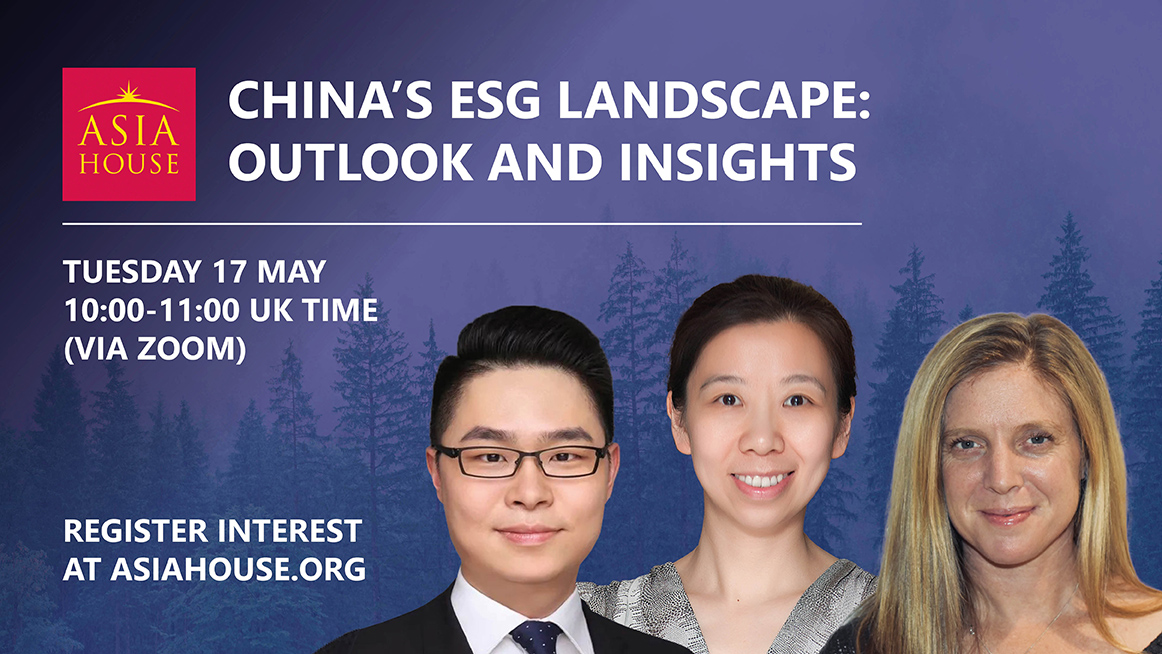Driving commercial and political engagement between Asia, the Middle East and Europe
Driving commercial and political engagement between Asia, the Middle East and Europe
Driving commercial and political engagement between Asia, the Middle East and Europe

In February 2022, the Chinese Ministry of Ecology and Environment (MEE) introduced new rules requiring certain domestic companies to share a range of annual environmental impact reports – adding to a burgeoning set of regulations requiring companies to disclose the impact of their business operations on the environment.
The development adds to a growing trend of ESG reporting in China, and is part of MEE’s ‘Plan for the Reform of the Legal Disclosure System of Environmental Information’, published in May 2021, which ties in closely with China’s 2060 net-zero pledge.
With these developments having clear implications for businesses in China, Asia House is convening key experts to discuss how the business environment is adapting to the evolving ESG landscape in China and beyond, and how companies can mitigate climate-impacting activity while strengthening corporate governance.
The session takes place digitally on Tuesday 17 May, 10:00 UK time.
Context
As in other jurisdictions, we have seen the growth of voluntary ESG reporting in China, particularly among listed companies and bond issuers. With an anticipated further strengthening of regulatory requirements, it is critical for businesses to understand the broader trends within China relating to ESG reporting, as well as the likely direction and pace of the introduction of new legislation to determine companies’ obligations.
Two of the concerns that have been expressed by businesses about ESG reporting in the international context relate to regulatory divergence and the data that underpins ESG reporting. Divergence has been noted in reporting protocols between economies as businesses, particularly large and listed companies, have increasingly included ESG disclosures and information in their reporting. While the general trend in China and other major markets is for increased focus on ESG reporting by companies, the methods and outputs to measure companies’ standards in these areas has not always been aligned between markets.
The quality of, and access to, the relevant data which can drive clarity and positive change for companies relating to their environmental, social and governance metrics has also been identified as a challenge. While China has made very significant progress in developing ESG reporting, much of the disclosures to date have been largely qualitative, which has led to companies and regulators looking at the sources of data and analytical tools to enhance the accuracy and relevance of ESG disclosures.
As countries around the world grapple with the measures needed to mitigate climate change, Asia House will explore how companies in China, both domestic and international, have approached ESG reporting to date, highlight the current trends among the business community, and identify the key issues for companies to understand as new regulations are rapidly being formed.
Confirmed speakers
 Charlie Humphreys, Director of Corporate Affairs (Moderator)
Charlie Humphreys, Director of Corporate Affairs (Moderator)
Charlie leads Asia House’s corporate and government relations, as well as the business and policy programme. He has led discussions at Asia House public policy events with leading business figures, government ministers from Asia and the west, and experts on Asia. He helped establish Asia House’s Advisory business, advising multinational corporations, governments and other institutions. With an academic background in political economy, before joining Asia House, Charlie worked in finance‚ managing portfolios for investors from Asia and Europe. He also spent a number of years in China where he worked on capacity building projects with the government.
 Professor Zhu Rui (Juliet), Professor of Marketing, Director of Social Innovation and Business for Good Center, Director of Common Prosperity and Social Innovation Center, Cheung Kong Graduate School of Business (CKGSB)
Professor Zhu Rui (Juliet), Professor of Marketing, Director of Social Innovation and Business for Good Center, Director of Common Prosperity and Social Innovation Center, Cheung Kong Graduate School of Business (CKGSB)
Prior to joining CKGSB, Zhu Rui was associate professor of marketing, and Canada Research Chair in consumer behavior at the University of British Columbia. She received her PhD in Marketing from University of Minnesota.
Professor Zhu has done extensive research on consumer behaviour, creativity, and advertising. In 2015, Professor Zhu won the CKGSB Research Excellence Award. In 2010, Professor Zhu won the Sauder Research Excellence Award. In 2007, Professor Zhu won the Marketing Science Institute’s Young Scholar award, which identified 20 scholars around the world who are leaders of the next generation of marketing academics. She is AMA-Sheth Foundation Doctoral Consortium Fellow in 2002. Professor Zhu’s research has been published in leading journals such as Science, the Journal of Consumer Research, and the Journal of Marketing Research, and has been featured in media outlets such as the New York Times, the Wall Street Journal, The Independent, CBC and Financial Times. She currently is an Associate Editor at the Journal of Marketing Research and serves on the editorial board at the Journal of Consumer Research and the Journal of Consumer Psychology.
Professor Zhu has extensive experience in teaching and consulting. She has taught Marketing Management and Consumer Behaviour at the PhD, EMBA, MBA, EE and Undergraduate levels.
 Wang Xitong, Head of ESG affairs/ Senior Associate, Everbright Belt & Road Green Fund
Wang Xitong, Head of ESG affairs/ Senior Associate, Everbright Belt & Road Green Fund
Xitong served in China’s Ministry of Commerce and worked in Chinese Embassies in UAE and Iraq as Commercial Attaché for several years, where he was engaged in promoting bilateral and multilateral economic and investment cooperation, conducting research on energy diversification and sustainable development in the Middle East.
He also worked in Everbright Environment, China’s largest environmental enterprise, and China Energy Engineering Corporation for years, where he was responsible for a number of international projects in renewable energy and environmental protection. He has a deep understanding of ESG Investment and Green Development.
 Michelle Cameron, Head of Sustainable Investment and Finance Sales, Asia at Refinitiv (LSEG)
Michelle Cameron, Head of Sustainable Investment and Finance Sales, Asia at Refinitiv (LSEG)
Michelle is the Head of Sustainable Investment and Finance Sales, Asia at Refinitiv. In her current role, she is responsible for Sustainable Investment, Data, and Analytics solutions, and helps clients make sustainable investment decisions through Refinitiv’s suite of solutions.
Michelle moved to Asia, settling in Sydney after a stint in Bangkok, to take up leadership roles in client-facing teams within Service, Customer Engagement, and Account Management functions. She specialises in buy-side client workflows and solutions. Michelle joined Reuters in the UK in 2001; during this time she was leading large teams of content professionals and managing strategic initiatives.
Michelle is a part of various industry bodies and networks supporting the growth of integrating sustainability practices across the financial community. She has completed her executive MBA degree specialising in Sustainable Business and has since then been passionately advocating the role businesses should play in contributing to the creation of a sustainable future.
 Phyllis Papadavid, Head of Research and Advisory, Asia House
Phyllis Papadavid, Head of Research and Advisory, Asia House
Phyllis Papadavid is a leading international economist and financial strategist with extensive research experience across the private and public sectors. She leads Asia House’s Research and Advisory work, driving the organisation’s research agenda and directing projects. Before joining Asia House, Phyllis was a Research Associate and formerly head of international macroeconomics at the Overseas Development Institute, and held leadership roles at BNP Paribas and Societe Generale CIB, and has advised the Government of Mongolia. She has also advised multilateral organisations including the World Bank and the United Nations. Phyllis is an associate faculty member in Applied Analytics and Strategy at Columbia University.
Phyllis’s recent research has focused on the management of financial shocks, the economic impact of COVID-19 on emerging markets, and the rising role of the renminbi, which was featured in Barron’s Asia’s Best Minds. She has a strong interest in financial inclusion, economic transformation and spatial economics.
